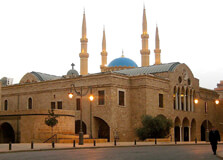
- Home
- Travel Packages
- Top Destination
-
Travel Attraction
By Category
Top Attraction

- Travel Agents
- Car Rentals
- Hotels

Saint George Greek Orthodox Cathedral
Saint George Greek Orthodox Cathedral, located in the heart of Beirut, is one of the most important religious landmarks in the city. This majestic cathedral is a beautiful representation of Christian heritage in Lebanon and serves as the spiritual center for the Greek Orthodox Christian community in Beirut. The cathedral is known for its stunning architecture, historical significance, and its role in the cultural and religious life of Beirut. It is a place of both worship and reflection, welcoming visitors from around the world to admire its beauty and rich history. How to Reach Saint George Greek Orthodox Cathedral, Beirut Saint George Greek Orthodox Cathedral is situated in Beirut's historic district, not far from the famous Martyrs' Square. The cathedral is easily accessible by car, taxi, or public transport. If you are staying in the central Beirut area, you can easily walk to the cathedral from other popular locations such as the Beirut Souks, Zaitunay Bay, and the Mohammad Al-Amin Mosque. If you're coming from Beirut's international airport, the cathedral is approximately 10 km away, and a taxi ride takes about 20-30 minutes, depending on traffic. Public transport options like buses and shared taxis also connect the airport with the city center, with the cathedral being just a short walk from the main bus stops in the downtown area. Weather in Beirut Beirut enjoys a Mediterranean climate, which means that it experiences hot summers and mild winters. The best time to visit Saint George Greek Orthodox Cathedral is during the spring (March to May) and fall (September to November), when the temperatures are comfortable for outdoor activities and sightseeing. During the summer (June to September), temperatures can reach 30°C (86°F) or higher, but the cathedral’s cool interior provides a welcome break from the heat. In the winter (December to February), temperatures are milder, ranging from 10°C to 18°C (50°F to 64°F), but it can be rainy. Despite the varying weather conditions, the cathedral remains a beautiful place to visit year-round. Timing for Visiting Saint George Greek Orthodox Cathedral The cathedral is open for visitors throughout the week. However, visitors are encouraged to check the cathedral’s schedule before visiting, as the times may vary due to religious services or special events. Typically, the cathedral is open to the public from 9:00 AM to 6:00 PM. Sunday services are held in the morning and early afternoon, so visitors should plan accordingly if they want to experience the service or avoid crowds during that time. If you want to visit during a quieter time, it’s best to visit in the afternoon on weekdays, especially outside of religious holidays or events. The cathedral is a place of worship, so it’s important to be mindful of the ongoing services and respect the space. Why is Saint George Greek Orthodox Cathedral Famous? Saint George Greek Orthodox Cathedral is famous for its historical and architectural significance. It is not only one of the oldest and most prominent churches in Beirut but also serves as a symbol of the deep-rooted Christian presence in Lebanon. The cathedral’s significance extends beyond its religious importance, as it has been a witness to the changing tides of Beirut’s history, from the Ottoman period to the modern era. The cathedral is also renowned for its exquisite architecture, which blends traditional Greek Orthodox styles with elements of Ottoman influence. It stands as a beautiful example of religious architecture and a testament to the cultural diversity that characterizes Beirut. Additionally, the cathedral’s location in the heart of the city, close to other historic landmarks, adds to its appeal for tourists and religious pilgrims alike. Entry and Visit Details About Saint George Greek Orthodox Cathedral, Beirut There is no entry fee to visit Saint George Greek Orthodox Cathedral, making it an accessible cultural and religious site for all visitors. While the cathedral is primarily a place of worship, tourists are welcome to explore its impressive interiors and learn about its history. Visitors are advised to be respectful of the sacredness of the space, especially during religious services, and should dress modestly when entering the cathedral. There are no formal guided tours, but visitors can explore the church on their own or hire local guides who are knowledgeable about the history of the cathedral. Some visitors also enjoy the peaceful atmosphere of the cathedral’s courtyard, which provides a great place for reflection and contemplation. History and Architecture of Saint George Greek Orthodox Cathedral The history of Saint George Greek Orthodox Cathedral dates back to the early 18th century when the first church dedicated to Saint George was built in the area. The current structure, however, was completed in 1828. The cathedral was designed in the traditional Byzantine style, with a large central dome and multiple smaller domes, all covered with ornate frescoes and mosaics that depict biblical scenes and saints. One of the most striking features of the cathedral is its impressive exterior, which features a blend of Greek Orthodox and Ottoman architectural styles. The white stone façade is adorned with intricate carvings and beautiful stained-glass windows that allow sunlight to filter into the interior, creating a serene and holy atmosphere. The cathedral’s interior is equally stunning, with detailed frescoes and mosaics covering the walls and ceilings. The altar area is decorated with gold and silver accents, adding to the overall splendor of the cathedral. The ornate chandeliers hanging from the ceiling and the intricate woodwork on the pews further enhance the cathedral’s beauty. Things to Do at Saint George Greek Orthodox Cathedral, Beirut Explore the Architecture: Take time to appreciate the beautiful Byzantine and Ottoman-inspired design of the cathedral, from its grand domes to its intricate carvings and mosaics. Attend a Religious Service: If you visit during a Sunday service or religious holiday, consider attending a service to experience the cathedral's spiritual atmosphere and the rich traditions of the Greek Orthodox Church. Photography: The cathedral’s architecture and interior offer plenty of photo opportunities. However, it’s important to be discreet and respectful when taking pictures, especially during prayer times. Reflect in the Courtyard: The cathedral has a peaceful courtyard where visitors can sit and reflect. It’s a tranquil spot to relax and absorb the calmness of the surroundings. Learn About the History: Discover the history of the cathedral, including its role in Beirut’s Christian heritage and the many significant events that have taken place there throughout the centuries. Interesting Facts About Saint George Greek Orthodox Cathedral The cathedral was originally built in the 18th century, but the current building was completed in 1828 and has undergone several renovations over the years. The cathedral is dedicated to Saint George, the patron saint of Beirut and one of Christianity’s most beloved saints. The cathedral is one of the most important religious sites in Lebanon, not only for the Greek Orthodox community but also for those interested in Beirut’s Christian history. Located in the heart of Beirut, the cathedral has been a witness to the many changes the city has undergone throughout the years, including during the Lebanese Civil War. The cathedral is also known for its remarkable acoustics, which contribute to the beauty of its religious services and music. Tips for Visiting Saint George Greek Orthodox Cathedral, Beirut Dress Modestly: As with most religious sites, visitors are expected to dress modestly when entering the cathedral. This includes covering your shoulders and legs. Women may also be asked to cover their hair with a scarf. Respect the Space: Be mindful of the ongoing religious services, and avoid loud conversation or disruptive behavior. Photography is allowed, but always ask for permission before taking close-up pictures of people or sacred objects. Visit During Off-Peak Hours: To avoid crowds, try visiting early in the morning or later in the afternoon. Sundays and religious holidays are particularly busy, especially during services. Take a Guided Tour: While there are no formal tours, local guides or volunteers often offer insight into the cathedral’s history. Consider hiring a guide to learn more about the church’s significance and architecture. Check for Special Events: The cathedral hosts various religious events throughout the year, including feasts and special services. If you’re interested, check the church's calendar to see if your visit coincides with any special celebrations.
Explore More